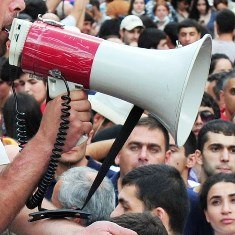(Guest post by David Grigorian) If there is a part of the world where Russia’s dominance is obvious, it is Armenia. The aftermath of the late July events in Armenia risk pushing the country even closer to Russia, eventually putting it on a path to authoritarianism and dictatorship. With the current pan-regional challenges confronting the United States and the West, ignoring developments in Armenia—and the Russian “plans” for Nagorno-Karabakh (NK)—would be a strategic blunder.
In the early hours of July 17, an armed group of 31 civil activists and veterans of the NK war took over a large police compound in downtown Yerevan. They called themselves the “Daredevils of Sassoon” (from a medieval Armenian epic poem). They used a truck to break open the gates and took eight police officers hostage, including a general and a colonel. One police officer died in the shootout, but all hostages were subsequently released (as an act of goodwill). The attackers made two demands: (1) release all political prisoners, including their leader Jirair Sefilian, who was arrested in June on charges of conspiracy against the government, and (2) the resignation of Serzh Sargsyan and his administration.
The actions of the “Daredevils” are widely seen as having to do with the outcome of the four-day war with Azerbaijan in April that ended with minor territorial losses for Armenia. There are expectations that a Russia-brokered peace plan will soon be imposed in NK based on the ceding of five tactically vital districts to Azerbaijan and agreeing to the presence of Russian troops as “peacekeepers.”
However, this will result in the remaining parts of NK being indefensible. The majority of Armenians see the plan as a devastating capitulation, abandoning the Armenian population of NK, and leading to increased violence in the region. Russia intends to use the measures to deepen Armenia’s dependence on Moscow while at the same time improving relations with an ever more powerful Azerbaijan.
The assault by the “Daredevils” was not an attempt to overthrow Sargsyan per se, but rather to spark a nation-wide, peaceful, protest movement calling for the replacement of his regime. In economic as well as in political terms, Sargsyan’s tenure has been a disaster. The corruption and cronyism that have flourished under his (mis)rule have brought Armenia’s economy to its knees, resulted in massive emigration, and turned Armenia more into a Russian satellite state.
After the police station takeover, there were massive street demonstrations led by prominent intellectuals and opposition politicians in support of the “Daredevils.” A panel of human rights experts called this outpouring of public support a “Robin Hood effect.” The police reportedly detained 775 people, including foreigners, many of whom were kept in compounds without access to food and medicine for extended periods of time. The brutality and use of stun grenades and tear gas against peaceful protesters and journalists on July 29 by the police were condemned by the U.S. Embassy in Yerevan and media advocates.
The deeds of the “Daredevils” were in some ways a controlled experiment. As war veterans, they were well aware of the destructive nature of guns and did not intend to use them beyond the police station takeover to advance their objectives. Laying down their arms was a testament to that. Others, who will come after them to fight the oppressive regime, may not be as wise and forward-looking. A recent report by Freedom House expressed a similar sentiment.
What is at stake? The geopolitical implications of the July events in Armenia are difficult to understate. Turkey’s recent accusation that the Unites States was complicit in the coup against Recep Erdoğan will likely push Turkey further from NATO and closer to Russia. If so, Armenia might be forced to enter into an alliance with Turkey, its historic enemy, and Russia, an unreliable partner. If Armenia is absorbed into that coalition, Georgia and its pro-Western orientation will be at stake next.
The only chance to weaken an impending Russian-Turkish alliance would be for the West to assist the pro-democracy movement in Armenia to help uphold its sovereignty. If the West had Armenia as an ally in the region, Georgia would have increased support and Iran’s access to Europe through friendly territory would be secured. The Russian plan to force Armenia to relinquish territories in NK and deploy Russian “peacekeepers” in the region would have grave and irreversible consequences for Western regional interests. The Russian plan should be torpedoed. This can be done inter alia by providing both moral and tangible support to those "on the barricades" in Armenia today.
Today, many of Armenia’s opposition leaders are in prison. The immoral actions of Sargsyan’s regime should be condemned, as called for by human rights groups and the mainstream media (see: “It’s Time for Armenia’s Leader to Go,” Huffington Post, August 4, 2016). Western governments have provided relatively little institutional support to Armenia’s civil society and opposition groups over the years, but they have dished out significant support to Armenia’s corrupt government and its repressive police and security apparatus (which is close to Russia). Transparency International has called on the international community to halt all funding for the Armenian police.
Washington should register the words of a “Daredevils” leader when he said: “We will build an independent Armenia. We should not become a guberniya [administrative territory] of some other state.” The state he meant, of course, was Russia. The United States is not supporting the right side in Armenia. By doing so, it is handing the Caucasus piece by piece back to Russia, which is gaining more control in the region now than at any time since the fall of the Soviet Union.
Co-founder, Policy Forum Armenia










